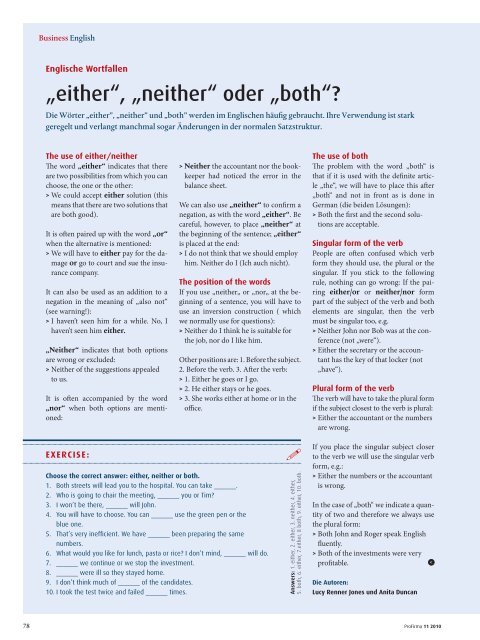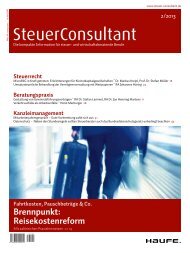Als PDF downloaden - Haufe.de
Als PDF downloaden - Haufe.de
Als PDF downloaden - Haufe.de
Erfolgreiche ePaper selbst erstellen
Machen Sie aus Ihren PDF Publikationen ein blätterbares Flipbook mit unserer einzigartigen Google optimierten e-Paper Software.
Business English<br />
Englische Wortfallen<br />
„either“, „neither“ o<strong>de</strong>r „both“?<br />
Die Wörter „either”, „neither” und „both” wer<strong>de</strong>n im Englischen häufi g gebraucht. Ihre Verwendung ist stark<br />
geregelt und verlangt manchmal sogar Än<strong>de</strong>rungen in <strong>de</strong>r normalen Satzstruktur.<br />
The use of either/neither<br />
Th e word „either“ indicates that there<br />
are two possibilities from which you can<br />
choose, the one or the other:<br />
> We could accept either solution (this<br />
means that there are two solutions that<br />
are both good).<br />
It is oft en paired up with the word „or“<br />
when the alternative is mentioned:<br />
> We will have to either pay for the damage<br />
or go to court and sue the insurance<br />
company.<br />
It can also be used as an addition to a<br />
negation in the meaning of „also not“<br />
(see warning!):<br />
> I haven’t seen him for a while. No, I<br />
haven’t seen him either.<br />
„Neither“ indicates that both options<br />
are wrong or exclu<strong>de</strong>d:<br />
> Neither of the suggestions appealed<br />
to us.<br />
It is oft en accompanied by the word<br />
„nor“ when both options are mentioned:<br />
EXERCISE:<br />
> Neither the accountant nor the bookkeeper<br />
had noticed the error in the<br />
balance sheet.<br />
We can also use „neither“ to confi rm a<br />
negation, as with the word „either“. Be<br />
careful, however, to place „neither“ at<br />
the beginning of the sentence; „either“<br />
is placed at the end:<br />
> I do not think that we should employ<br />
him. Neither do I (Ich auch nicht).<br />
The position of the words<br />
If you use „neither„ or „nor„ at the beginning<br />
of a sentence, you will have to<br />
use an inversion construction ( which<br />
we normally use for questions):<br />
> Neither do I think he is suitable for<br />
the job, nor do I like him.<br />
Other positions are: 1. Before the subject.<br />
2. Before the verb. 3. Aft er the verb:<br />
> 1. Either he goes or I go.<br />
> 2. He either stays or he goes.<br />
> 3. She works either at home or in the<br />
offi ce.<br />
Choose the correct answer: either, neither or both.<br />
1. Both streets will lead you to the hospital. You can take ______.<br />
2. Who is going to chair the meeting, ______ you or Tim?<br />
either, 4.<br />
3. I won’t be there, ______ will John.<br />
4. You will have to choose. You can ______ use the green pen or the<br />
neither,<br />
blue one.<br />
3.<br />
5. That’s very ineffi cient. We have ______ been preparing the same<br />
either,<br />
numbers.<br />
2.<br />
6. What would you like for lunch, pasta or rice? I don’t mind, ______ will do.<br />
7. ______ we continue or we stop the investment.<br />
either, 1.<br />
8. ______ were ill so they stayed home.<br />
9. I don’t think much of ______ of the candidates.<br />
10. I took the test twice and failed ______ times. Answers:<br />
The use of both<br />
Th e problem with the word „both“ is<br />
that if it is used with the <strong>de</strong>fi nite article<br />
„the“, we will have to place this aft er<br />
„both“ and not in front as is done in<br />
German (die bei<strong>de</strong>n Lösungen):<br />
> Both the fi rst and the second solutions<br />
are acceptable.<br />
Singular form of the verb<br />
People are oft en confused which verb<br />
form they should use, the plural or the<br />
singular. If you stick to the following<br />
rule, nothing can go wrong: If the pairing<br />
either/or or neither/nor form<br />
part of the subject of the verb and both<br />
elements are singular, then the verb<br />
must be singular too, e.g.<br />
> Neither John nor Bob was at the conference<br />
(not „were“).<br />
> Either the secretary or the accountant<br />
has the key of that locker (not<br />
„have“).<br />
Plural form of the verb<br />
Th e verb will have to take the plural form<br />
if the subject closest to the verb is plural:<br />
> Either the accountant or the numbers<br />
are wrong.<br />
If you place the singular subject closer<br />
to the verb we will use the singular verb<br />
form, e.g.:<br />
> Either the numbers or the accountant<br />
is wrong.<br />
In the case of „both“ we indicate a quantity<br />
of two and therefore we always use<br />
the plural form:<br />
> Both John and Roger speak English<br />
fl uently.<br />
> Both of the investments were very<br />
profi table.<br />
Die Autoren:<br />
Lucy Renner Jones und Anita Duncan<br />
78 ProFirma 11 2010<br />
5. both, 6. either, 7.either, 8 both, 9. either, 10. both.

















